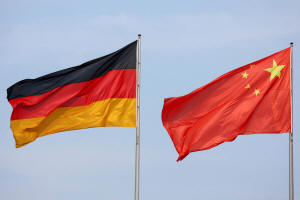Germany publishes new strategy on 'increasingly assertive' China
 Send a link to a friend
Send a link to a friend
 [July 13, 2023]
BERLIN (Reuters) - Germany published its long-awaited
China strategy on Thursday, which took stock of an "increasingly
assertive" Beijing and outlined possible responses such as outbound
investment controls on cutting-edge technology with military use. [July 13, 2023]
BERLIN (Reuters) - Germany published its long-awaited
China strategy on Thursday, which took stock of an "increasingly
assertive" Beijing and outlined possible responses such as outbound
investment controls on cutting-edge technology with military use.
The 64-page document comes amid a broader push in the West to reduce
strategic dependencies on a China - which policymakers have labelled
"de-risking" - amid concerns about Beijing increasingly seeking to
assert its hegemony in the Indo-Pacific.
"China has changed. As a result of this and China's political decisions,
we need to change our approach to China," said the document, which was
agreed by the cabinet on Thursday after months of wrangling within
Chancellor Olaf Scholz's three-way coalition.
China remained an indispensable partner to tackle global challenges such
as climate change and pandemics, it said.
However, it was also increasingly assertive in its attempts to change
the rules-based international order with consequences for global
security.
China's decision to expand its relationship with Russia also had
immediate security implications for Germany, it said.

Germany would continue to strengthen its military presence and
cooperation with partners in the Indo-Pacific, it said, warning that the
status quo of the Taiwan Strait may only be changed by peaceful means
and mutual consent.
"Military escalation would also affect German and European interests,"
the strategy said.
Germany would expand its close relations with Taiwan while continuing to
adhere to the "One China policy", which recognises the government of the
People's Republic of China as the sole legal government of China.
[to top of second column]
|

The flags of Germany and China are seen
ahead of a meeting between German Chancellor Olaf Scholz and Chinese
Premier Li Qiang in Berlin, Germany, June 19, 2023. REUTERS/Fabrizio
Bensch

On the economy, the strategy outlined proposals to reduce critical
dependencies on China, in line with what has previously been agreed
by the European Union.
There is particular concern in Germany about the impact of this
de-risking strategy on an economy already in recession given its
strong business ties with China, which became the country's single
biggest trade partner in 2016.
At now nearly 300 billion euros ($325 billion) in imports and
exports, it is a core market for top German companies including
Volkswagen, BASF and BMW.
"The Federal Government affirms its responsibility and determination
to coordinate with partners on preventing the cutting-edge
technologies we develop from being used to further military
capabilities that threaten international peace and security," the
strategy said.
"We acknowledge that ... appropriate measures that are designed to
counter risks connected with outbound investment could be important
as a supplement to existing instruments for targeted controls of
exports and domestic investments."
(Reporting by Sarah Marsh, Andreas Rinke, Matthias Williams,
Friederike Heine, Miranda Murray, Rachel More; Editing by Rachel
More and Alex Richardson)
[© 2023 Thomson Reuters. All rights
reserved.]This material may not be published,
broadcast, rewritten or redistributed.
Thompson Reuters is solely responsible for this content. |